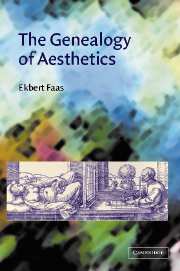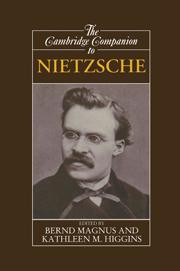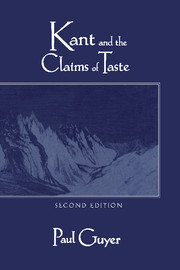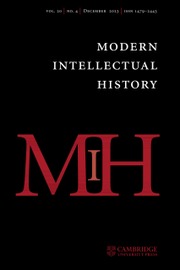The Genealogy of Aesthetics
£61.99
- Author: Ekbert Faas, York University, Toronto
- Date Published: August 2002
- availability: Available
- format: Hardback
- isbn: 9780521811828
£
61.99
Hardback
Looking for an inspection copy?
This title is not currently available on inspection
-
Is it body or spirit that makes us appreciate beauty and create art? The distinguished Canadian critic Ekbert Faas argues that, with occasional exceptions like Montaigne and Mandeville, the mainstream of western thinking about beauty from Plato onwards has overemphasised the spirit, or even execrated the body and sexuality as inimical to the aesthetic disposition. The Genealogy of Aesthetics redresses this imbalance via a radical re-reading of seminal thinkers like Plato, Augustine, Kant, Hegel, Marx, Heidegger and Derrida. Professor Faas attacks both the traditional and postmodern consensus, and offers a new pro-sensualist aesthetics, heavily influenced by Nietzsche, that draws on contemporary neo-Darwinian cognitive science. A work of both polemic and considerable learning, The Genealogy of Aesthetics marks a radical new departure in thinking about art, of interest to all serious students of the humanities and cognitive sciences, which no future work in this field can afford to ignore.
Read more- A profound polemic on a major subject, by a distinguished cultural critic
- Will annoy both traditionalist and postmodern thinkers in equal measure
- Strong linkages with cognitive science outside orthodox humanist channels
Reviews & endorsements
'This extensively researched and outspoken book by Ekbert Faas gives aesthetic theory a decisive push in its move from the head into the body, as it were, and in so doing opens aesthetics to a wide array of new approaches from the direction, broadly speaking, of the life sciences and neuroscience … With its overview of the new kinds of aesthetic-neuroscientific-evolutionary approaches, it is a must for those interested in these interdisciplinary ventures that are no doubt before us.' The European Legacy: Toward New Paradigms
Customer reviews
Not yet reviewed
Be the first to review
Review was not posted due to profanity
×Product details
- Date Published: August 2002
- format: Hardback
- isbn: 9780521811828
- length: 454 pages
- dimensions: 236 x 160 x 34 mm
- weight: 0.861kg
- contains: 14 b/w illus.
- availability: Available
Table of Contents
Acknowledgements
Introduction
1. Plato's transvaluations of aesthetic values
2. Proto-Nietzschean opponents to Plato
3. Late Antiquity, Plotinus, and Augustine
4. Augustine's Platonopolis
5. The Middle Ages
6. The Renaissance
7. The Renaissance Academy, Ficino, Montaigne, and Shakespeare
8. Hobbes and Shaftesbury
9. Mandeville, Burke, Hume, and E. Darwin
10. Kant's ethicoteleological aesthetics
11. Kant's midlife conversion
12. Hegel, Feuerbach, and Marx
13. Marx's Nietzschean moment
14. Heidegger's 'destruction' of traditional aesthetics
15. Heidegger contra Nietzsche
16. Heidegger, Nietzsche, and Derrida
17. Différance, Freud, Nietzsche, and Artaud
18. Derrida's mega-transcendentalist Mimesis
19. Postmodern or Pre-Nietszschean? Derrida, Lyotard, and de Man
20. The Postmodern revival of the aesthetic ideal
Afterword.
Sorry, this resource is locked
Please register or sign in to request access. If you are having problems accessing these resources please email [email protected]
Register Sign in» Proceed
You are now leaving the Cambridge University Press website. Your eBook purchase and download will be completed by our partner www.ebooks.com. Please see the permission section of the www.ebooks.com catalogue page for details of the print & copy limits on our eBooks.
Continue ×Are you sure you want to delete your account?
This cannot be undone.
Thank you for your feedback which will help us improve our service.
If you requested a response, we will make sure to get back to you shortly.
×






